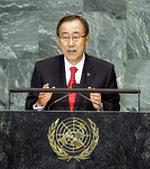 聯合國年度高層會議23日於紐約召開,聯合國秘書長潘基文在開幕致詞中極力呼籲全球領袖共同合作,以解決氣候變遷、能源危機、懸而未決的貧窮問題及蘇丹達爾富爾地區的衝突等這些極度迫切且棘手的問題。
聯合國年度高層會議23日於紐約召開,聯合國秘書長潘基文在開幕致詞中極力呼籲全球領袖共同合作,以解決氣候變遷、能源危機、懸而未決的貧窮問題及蘇丹達爾富爾地區的衝突等這些極度迫切且棘手的問題。
他也警告,有跡象顯示,對於全球各地需要援助的事件,儘管某些危機規模之大,有些領袖與國家似乎仍不太願意提供進一步的幫助。 「我察覺到一個危險的現象,就是有些國家重視內部利益勝於與各國息息相關的未來,」潘基文說道,「對於以往所作的一切成果,如今我們卻在走回頭路,尤其在持續發展議題、以及公平分享全球成長帶來的效益上更是如此。」
針對亞洲、拉丁美洲及其他新興國家正掀起一股新勢力與領導中心,潘基文表示,「我們正處於一個巨大的轉變時期。」
不論是在印尼巴里島的國際氣候會談,或者是要對抗瘧疾、愛滋病等疾病,保障人權的提升、確保各國對所有碎弱的人群履行「保護責任」的理念等等;如果全世界想重獲為上述議題努力的氣勢,那麼,明智的領導是至關重要的。 潘基文說:「要為公平正義發聲,無畏強大的反對聲浪為氣候變遷問題採取行動,且就算影響國家本身利益,仍堅決反對國家貿易保護主義,施行貿易優惠,都需要領導力。這就是我們現在在這裡的原因。」
大約有120位國家元首或政府代表參與23日舉行的聯合國高層級會議揭幕式,而聯合國192個會員國的代表們在接下來兩周將陸續在會中發表演說。
美國總統布希23日在會中發表演說,把焦點放在對抗恐怖主義份子上,然而對於環境或是氣候變遷、能源供給及乾淨水資源等迫切的環境議題,布希未置一詞。 「在未來幾十年,美國及其他多角化組織必須持續對抗恐部分子,」布希最後一次以總統之職在聯合國大會中說道,「這項任務需有清楚的展望。我們必須了解恐怖份子是殘忍的激進主義者,他們挺而走險、推翻偉大宗教的教條,並儘可能灌輸他人偏頗的想法。」
法國總統薩科奇(Nicolas Sarkozy)23日在致詞中向與會者表示,如果全球打算克服最迫切需要解決的問題,那麼聯合國安理會成員及其他重要的國際組織就必須加緊拓展規模。薩科奇針對所有重大問題提出告誡道,「我們有責任付諸行動,而不是一直忍受。」;盡力對抗氣候變遷也包含在主要議題內。
巴西總統魯拉(Luiz Inacio Lula da Silva)提醒與會者,如今預測的長期經濟危機儼然已成為現在得面對的殘酷事實。魯拉的經驗顯示出,甘蔗乙醇和生質柴油可以減少全球對於化石燃料的依賴,同時也能創造工作機會、恢復使用品質不良的土地,以及增加食物產能等。
United Nations Secretary-General Ban Ki-moon today opened the General Assembly's annual high-level debate by urging world leaders to work together to solve the most pressing and intractable problems, from climate change and the energy crisis to entrenched poverty and the conflict in Sudan's Darfur region.
But he warned of signs that many leaders and countries are unwilling to do more to help those around the world who need support, despite the scale of some of the crises.
"I see a danger of nations looking more inward, rather than towards a shared future," Ban said. "I see a danger of retreating from the progress we have made, particularly in the realm of development and more equitably sharing the fruits of global growth."
As new centers of power and leadership are emerging in Asia, Latin America and elsewhere in the newly developed world, "We are on the eve of a great transition," he said.
Wise leadership is vital if the world is to regain the momentum on climate change produced by negotiations in Bali last year, combat malaria and HIV/AIDS or ensure that human rights are upheld and the principle of "responsibility to protect" is extended to all vulnerable populations.
"It takes leadership to speak out for justice; to act on climate change despite powerful voices against you; to stand against protectionism and make trade concessions, even in our enlightened self-interest. Yet," said Ban, "that is why we are here."
Nearly 120 heads of state or government are in attendance for today's opening of the high-level segment of the General Assembly, and representatives of all 192 UN member states are expected to address the General Assembly over the next two weeks.
Addressing the General Assembly today, U.S. President George W. Bush focused on combating terrorism and made no mention of the environment or of urgent environmental issues such as climate change, energy supplies and clean water.
"In the decades ahead, the United Nations and other multilateral organizations must continually confront terror," said President Bush in his last address to the General Assembly as president. "This mission requires clarity of vision. We must see the terrorists for what they are: ruthless extremists who exploit the desperate, subvert the tenets of a great religion, and seek to impose their will on as many people as possible."
French President Nicolas Sarkozy told the General Assembly today that the membership of the Security Council and other key international institutions must be urgently broadened if the world is to overcome its most acute crises.
Sarkozy warned that on all major issues, including efforts to combat climate change, "We have a duty to act, not endure."
Brazilian President Luiz Inácio Lula da Silva reminded the General Assembly that now long-predicted economic crises have become "today's harsh reality."
President Lula said Brazil's own experience illustrates that sugar cane ethanol and biodiesel production can reduce global dependency on fossil fuels and at the same time create jobs, regenerate degraded land and expand food production.




